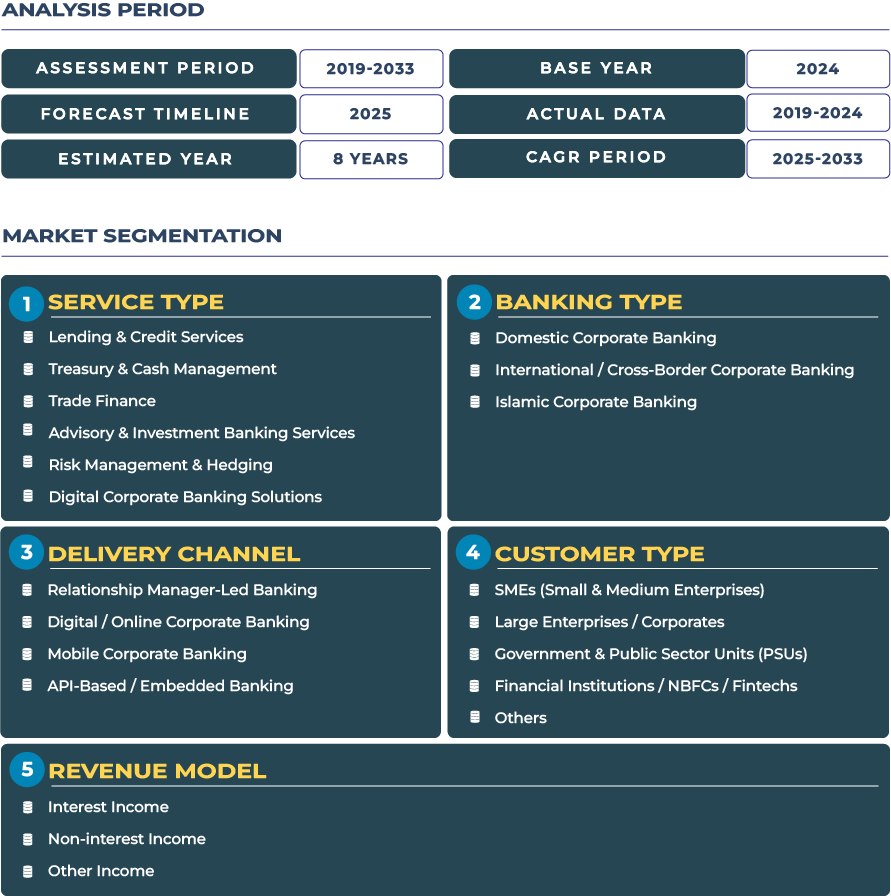Innovation Banking and Startup-Focused Corporate Solutions in India: Driving SME and Startup Growth
The India Corporate Banking Market is evolving rapidly, driven by the country's burgeoning startup ecosystem and expanding SME sector. Indian corporate banks are increasingly deploying innovation banking solutions, fintech-enabled lending, and digital treasury platforms to serve the unique requirements of fast-growing startups and mid-market corporates. Platforms integrating automated payments, real-time cash management, and trade finance capabilities are now standard offerings, enabling corporates to optimize liquidity, reduce transaction friction, and scale cross-border operations. These innovations are shaping the India corporate banking landscape into a more flexible and digitally integrated ecosystem.
Note:* The market size refers to the total revenue generated by banks through interest income, non-interest income, and other ancillary sources.
The Indian corporate banking sector is projected to grow from USD 199.6 billion in 2025 to USD 340.3 billion by 2033, representing a CAGR of 6.9%. This growth is underpinned by government-backed infrastructure initiatives, widespread digital adoption in payments, and deepening collaboration with fintech players. Banks are actively designing credit facilities, trade finance instruments, and treasury solutions aligned with the operational realities of startups and corporates, strengthening the corporate banking ecosystem across major industrial hubs like Mumbai, Bengaluru, and Hyderabad.
India Corporate Banking Market Outlook: Leveraging Innovation Banking to Empower India’s Corporate and Startup Sector
The India corporate banking ecosystem is increasingly characterized by tailored solutions for startups and SMEs seeking rapid scale-up capital. Innovation banking models provide embedded digital tools for credit assessment, cross-border payments, and real-time working capital optimization. Corporates benefit from integrated digital platforms that combine treasury management, risk analytics, and multi-currency payment solutions, while banks gain deeper customer engagement and recurring revenue streams. Government incentives for startups, such as Startup India, coupled with digital finance initiatives by the Reserve Bank of India, have accelerated adoption, ensuring that the corporate banking sector remains a cornerstone of India’s economic growth.
Moreover, corporate banks are increasingly acting as enablers of cross-border trade, supporting international expansion for startups and SMEs. Digital platforms allow for seamless FX management, trade documentation, and compliance, reducing operational risks for corporates engaging in global supply chains. The ability to access working capital solutions quickly, combined with fintech partnerships, is shaping India corporate banking market into a dynamic and highly responsive ecosystem.
Drivers & Restraints: Understanding Growth Catalysts and Market Barriers in India Corporate Banking
Driving Factors: Infrastructure Financing, Digital Payments, and ERP Integration
India corporate banking sector is being driven by the extensive financing needs of corporates in infrastructure, manufacturing, and renewable energy. Rapid adoption of fintech solutions and integrated corporate payments is enabling banks to streamline transaction processing and improve cash flow management. Corporate ERP and payment gateway integrations allow for seamless reconciliation and treasury management, which is particularly critical for mid-sized and large enterprises operating across multiple states. These developments have reinforced the corporate banking ecosystem, supporting sustained growth in lending, trade finance, and digital solutions.
Restraining Factors: Regulatory Complexity, Informal MSMEs, and Price Sensitivity
While growth is strong, India corporate banking industry faces challenges, including high regulatory scrutiny and frequent policy updates, which require banks to maintain robust compliance frameworks. A significant portion of the MSME sector operates outside formal banking channels, limiting market penetration. Additionally, price sensitivity among mid-market corporates necessitates competitive lending rates and transaction fees. Banks are therefore balancing the need for digital and specialized offerings with cost-effective solutions to maintain profitability and client loyalty.
Trends & Opportunities: Digital Payments, Green Financing, and Supply-Chain Innovation
Major Trends: UPI Spillover, Government Infrastructure Push, and Supply-Chain Finance
The India corporate banking market is witnessing accelerated adoption of Unified Payments Interface (UPI) solutions for corporate payments, providing near-instant settlement and improved liquidity management. Government-led infrastructure initiatives and renewable energy projects are driving demand for project finance and working capital facilities. Additionally, domestic manufacturers are increasingly leveraging supply-chain finance solutions to optimize receivables and streamline operations. These trends are transforming the corporate banking landscape into a highly interconnected and digitally enabled market.
Opportunities: SME Digital Financing, RTP Solutions, and Green Capex
Opportunities in India corporate banking market include SME digital procurement financing, real-time payment (RTP) platforms, and green transition financing for manufacturing enterprises. Banks are leveraging UPI and API integrations to offer instant settlement services and supply-chain financing, enhancing liquidity for SMEs. Green capex financing, aligned with government subsidies, presents a strategic avenue to support environmentally sustainable corporate growth while tapping into emerging market needs. These initiatives are strengthening the corporate banking ecosystem and fostering long-term engagement with India’s corporate sector.
Competitive Landscape: Leading Banks Enhance Digital and SME Offerings
Major players in India corporate banking sector include HDFC Bank, ICICI Bank, State Bank of India, Axis Bank, and Kotak Mahindra Bank. These banks are implementing strategies such as UPI-integrated corporate payment rails, mass SME onboarding for supply-chain finance, and green capex financing aligned with government incentives. Recent initiatives include HDFC Bank’s digital SME financing platform launched in 2024, offering instant lending and treasury services to startups, and ICICI Bank’s expansion of cross-border trade finance solutions, enhancing liquidity for exporters and manufacturing hubs.







